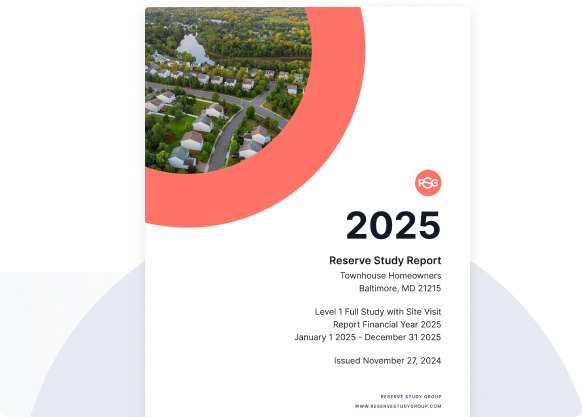

-- Reserve Study Requirements
Who needs a Reserve Study.
Maryland law mandates that all condominium and homeowner associations (HOAs) conduct a reserve study.
How often do you need to update a Reserve Study.
Maryland law mandates that all condominium and homeowner associations (HOAs) conduct a reserve study.
Additional Information
Only those associations responsible for common areas with a total initial purchase and installation cost under $10,000 are exempt from these requirements
Serving the Northeast
Serving the Great Lakes
Serving the Mountain
Serving the Southeast
Serving the Pacific West
Fredericksburg
- 1320 Central Park Blvd
Suite 200
Fredericksburg VA 22401 - Phone: 888.315.2843
Fax: 888.316.4587
Email: mail@reservestudygroup.com


We focus on the detail and the big picture.
Our reserve study approach is simple. We provide you with the insight needed to make fast, accurate and informed decisions. We focus on understanding your situation and providing funding solutions that are designed with your goals in mind.
-- Reserve Study Requirements
Legislation
The new legislation extends the need for reserve studies statewide. Previously only Montgomery and Prince George’s Counties were required to undertake a reserve study every five (5) years.
It should be noted that Homeowner Associations (HOAs) with common assets of $10,000 or less are exempt from the new law.
-- Reserve Study
Our team of reserve study professionals works with associations throughout Maryland, Virginia, North & South Carolina.

- Baltimore
- Baltimore
- Baltimore
- Baltimore
- Baltimore
- Baltimore
- Baltimore
- Baltimore
- Baltimore
- Baltimore
Frequently asked questions
What is the new reserve study law in Maryland?
As of October 1, 2022, all Maryland condominiums and HOAs with common areas over $10,000 must conduct a reserve study every 5 years.
What is the HOA reserve study requirement in Maryland?
HOAs must complete a reserve study by October 1, 2023, if one hasn’t been done since October 1, 2018, and update it at least every 5 years.
How much do reserve studies cost?
Reserve studies typically cost between $2,500 and $10,000, depending on property size and complexity.
How often should an HOA do a reserve study?
In Maryland, reserve studies must be updated every 5 years.
What is section 11-109.4 to the Maryland condominium Act?
It mandates reserve studies for condos with common elements exceeding $10,000 in replacement costs and outlines update requirements.
If you have any questions, our team of reserve study professionals will contact you immediately.







